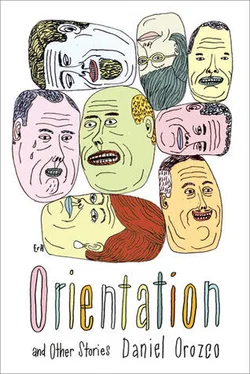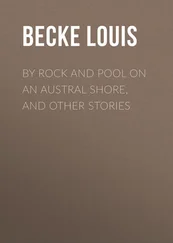The Presidente-in-Exile sighs, flips off the TV. He cocks his head, listens. He drops the bloody hankie on a kitchen counter. He opens the refrigerator, finds a pair of baked chickens, and tugs at a drumstick until it comes off. He pads to the sliding glass door, unlocks and opens it, crosses to the iron fence a few yards away. He rat-a-tats the chicken leg between two pales, and waits. He knows the dogs are trained not to take food. They never come. But tonight he hears them, panting and tumbling down the hill, crashing through undergrowth, then moving past him along the fence perimeter toward the back of the house. Could they be hunting? He has heard that the dogs once killed and ate a man. Gallardo — talking to the gardeners or chatting up Stroessner’s monkeys — has relayed such stories to him. A drug lord tossed an informant to them for vengeance and sport. A Mossad agent prowling for Nazis got trapped in the cañón . Some street kid climbed over the fence on a dare. The stories are varied; they always change, and they all intrigue the Presidente-in-Exile.
He follows the dogs along the gravel walkway that runs the length of the house for thirty yards, toward the back. Where the cook lives. He comes around the corner into a tiny patio area no more than fifteen feet square. A pool of light from Cook’s open apartment door illuminates the soles of her feet, the backs of her calves. She is on her knees, up against the cañón fence. Her back is to him, and her hands are moving in the gaps between the iron pales.
The Presidente-in-Exile is peeved. She is feeding the dogs. “You’re not supposed to do that,” he says to her. He can see their tongues, pink and sudden at her hands in the dark. “Hey!” he says. “What the fuck are you doing?” She turns, and her level gaze confuses him. He looks at the chicken leg in his hand, points it at her. “You stop that now .” But she doesn’t. She seems unfazed, perhaps even bored. There was a time when he could have done anything to her and gotten away with it. There was a time when women were afraid of him. But he sees nothing in this india ’s face. It is the face of a woman who wouldn’t care what you did to her. She turns away, back to the dogs.
And as swiftly as it came, his anger is gone, dropping away like a stone off a precipice. He sighs, picks his way back down the gravel path toward the kitchen. He gnaws absently at his drumstick. His eye stings and he wipes at it. Blood. The cut has opened up again. Something in his stomach shifts and plops, and he grimaces. He’ll need a bromo before bed, and the thought of this leaves him somehow disconsolate and vaguely depressed, and only adds to the chain of disappointments in this life of exile.
* * *
The Assassin of the Presidente-in-Exile gets the word. Osvaldo, calling from the magazine kiosk on Avenida España, repeats the go code into the phone: “Blanco, blanco, blanco.” The Assassin of the Presidente-in-Exile loads a rocket into the launcher and sets a percussion cap. He hoists the launcher onto his shoulder and rests the barrel on the lip of the sill. Through the open window he trains the sight on a statue in a sliver of park across the street. He focuses on it — Francisco Solano López, killed at the glorious battle of Cerro Corá in 1870. He can hear Analisa warming up the Chevy pickup in the driveway outside. The engine rumbles precariously. They’ve had trouble with the throttle, and she revs it up. He can see Josias at the curb watching for the Mercedes, his M16 shielded by a topcoat draped over his wrist. He sees Lourdes across the street, minding a baby stroller filled with Browning 9mm pistols and an Ingram MAC-10. He sees Josias wave, hears the truck ease down the length of the driveway, piston-slap rattle receding. Through the sight he watches the Mercedes glide into view. He lifts the barrel of the launcher off the sill and glides with it until the Mercedes is stopped short, blocked by Analisa in the Chevy. He seeks the trigger and finds it and nestles it into the crook of his index finger.
The Assassin of the Presidente-in-Exile inhales. He is suddenly taken with the clarity of the scene before him. What a beautiful morning! Sunshine pours into the street, filling it like a container. The Mercedes sits submerged in radiance, tense and gleaming in honeyed light, as if straining against the very weight of light itself. It shimmers within the crosshatched field of the launcher’s reticle.
The Assassin of the Presidente-in-Exile exhales. The rocket fires and scoots waggle-tailed toward its target twenty yards away, slips into the armored Mercedes. The Mercedes levitates for an instant and disappears behind coils of black smoke. The Assassin of the Presidente-in-Exile drops the launcher, stands up, peels off his latex gloves. The sofa behind his station at the window smolders from the rocket exhaust. A black circle six feet across is seared into the wall; the paint in it bubbles and pops. He goes out the back door of the house, into the yard. He can hear the ack-ack of semiautomatic fire — Josias and Analisa and Lourdes emptying their weapons into the wreckage. He passes through a gate in the property fence that opens onto an alley, turns right onto Avenida Venezuela, and strolls to a bus stop at the corner. The crowd there is looking past him, gawking upward at a column of smoke rising thickly into the blue. He turns, gawks with them. He recalls something from a book he’d been reading, a history of the North American Indians, and he tries to remember what it was Sioux warriors told each other before going into battle. The bus pulls up, and he stands on line with the other commuters. He jingles the change in his pocket. He can hear the click and pop of pistol fire, benign in the distance. The bodyguards in the Datsun have arrived. He pays the driver, moves into the press of standing passengers, situates himself near the back door. He pats the Browning pistol in his coat pocket and says a prayer for Josias and Analisa and the others — his compas for these past fifteen months.
And then it comes to him, and he smiles for remembering it. Today is a good day to die .
* * *
In the backseat of the Mercedes, the Presidente-in-Exile looks up from his paper.
The newspaper in his hands disappears, goes poof! like a magician’s trick. His hands smoke and glow and burst into flames. The suit he is wearing vaporizes. His eyeballs explode, and his mouth fills with gasoline. The backseat of the Mercedes becomes an arena of transformation, the effulgent white-hot heart of a flame brighter than a hundred suns, a whirlpool of shrapnel and fire taking its passenger apart. Hands — gone! Yet there is the glide of silk on the fingertips. Eyes — no more! Yet before them hang the pale breasts of a first love, a girl from Stony Point, New York, named Amanda. The slide of gasoline on the tongue gives way to the textures of pulque , milky and sweet. There is the smell of Cohibas, of Tres Flores brilliantine. The scrape of a father’s beard against skin, the slap of breakers on a shore like the beating of a giant’s heart. The tug of an erection. Strokes and caresses. A pressing upon the chest like the vise grips of God. Gunfire in the distance. There is running, stumbling. There is falling. Free fall. And amid the onslaught of sensations without stimulus and memories without context, amid the random firing of synapses in a brain poaching inside its own skull, what is revealed and understood of a life in its last instant — as the Presidente-in-Exile looks up from his paper and mutters “Fuck me” when his driver’s head disappears — what is understood is simply this: the transformative power of weaponry and surprise.
* * *
In the back patio of a trattoria three blocks away, an old man sits hunched over the morning paper laid out on the table before him, waiting for his espresso to cool. With his right hand he flips the pages of El Diario . With his left he holds the crown of a gray felt fedora and fans himself with the brim. He turns a page, peers at it. The fedora in his left hand stops moving. His breath catches, stops, begins again. He throws his hat on the page open before him. He looks around with histrionic furtiveness, in the manner of a lonely old man reveling in the melodrama of the moment. He sees mostly other lonely old men. One is tearing up a croissant and feeding the pieces to a tiny yellow dog in his lap. Two others sit staring down at a checkerboard between them.
Читать дальше












